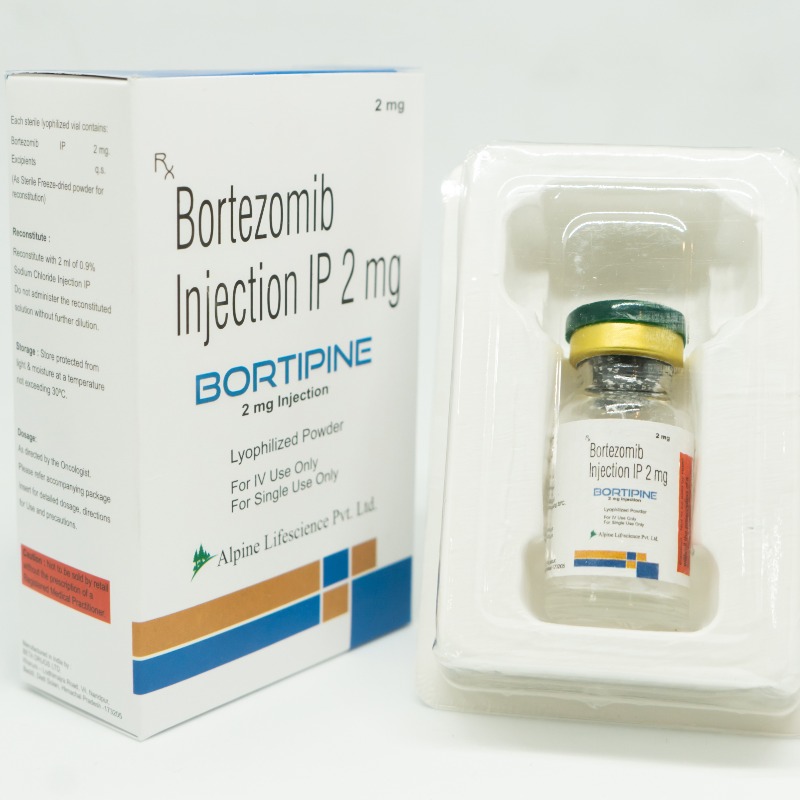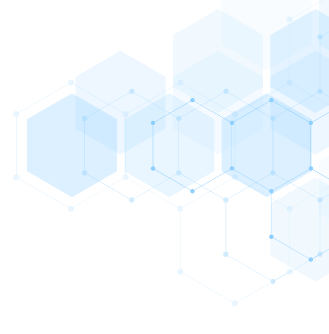DESCRIPTION
Mechanism of Action
• Reversible inhibitor of the 26S proteasome.
• The 26S proteasome is a large protein complex that degrades ubiquinated
proteins. This pathway plays an essential role in regulating the
intracellular concentrations of various cellular proteins.
• Inhibition of the 26S proteasome prevents the targeted proteolysis of
ubiquinated proteins, and disruption of this normal pathway can
affect multiple signaling pathways within the cell, leading to cell
death.
• Results in downregulation of the NF-κB pathway. NF-κB is a transcription
factor that stimulates the production of various growth
factors, including IL-6, cell adhesion molecules, and antiapoptotic
proteins, all of which contribute to cell growth and chemoresistance.
Inhibition of the NF-κB pathway by bortezomib leads to inhibition
of cell growth and restores chemosensitivity.
Mechanism of Resistance
• Activation of NF-κB pathway via proteasome-independent mechanisms
• Mutations in the proteasome b5 subunit (PSMB5) gene leading to
overexpression of PSMB5 protein.
• Increased expression of the multidrug-resistant gene with elevated
P170 protein levels, which leads to increased drug efflux and
decreased intracellular drug accumulation.
Absorption
Bortezomib is given by the intravenous and subcutaneous routes. Total systemic
exposure is equivalent for intravenous and subcutaneous administration.
Distribution
Volume of distribution not well characterized. About 80% of drug bound
to plasma proteins.
Metabolism
Bortezomib has a mean elimination half-life of 76 to 108 hours upon
multiple dosing with the 1.3 mg/m2 dose. It is metabolized by the liver cytochrome
P450 system. The major metabolic pathway is deboronation, forming
two deboronated metabolites. The deboronated metabolites are inactive
as 26S proteasome inhibitors. Elimination pathways for bortezomib have
not been well characterized.
Indications
1. FDA-approved for the treatment of multiple myeloma.
2. FDA-approved for the treatment of mantle cell lymphoma after at
least one prior therapy.
Dosage Range
Recommended dose for relapsed multiple myeloma and mantle cell
l ymphoma is 1.3 mg/m2 administered by IV or SC twice weekly for
2 weeks (on days 1, 4, 8, and 11) followed by a 10-day rest period (days
12–21).
Drug Interaction 1
Ketoconazole and other CYP3A4 inhibitors—Co-administration of
ketoconazole and other CYP3A4 inhibitors may decrease the metabolism
of bortezomib, resulting in increased drug levels and potentially
increased€toxicity.
Drug Interaction 2
CYP3A4 inducers—Co-administration of bortezomib with potent CYP3A4
inducers, such as rifampin, may increase the metabolism of bortezomib,
resulting in decreased drug levels.
Drug Interaction 3
St. John’s Wort may alter the metabolism of bortezomib, resulting in
decreased drug levels.
Special Considerations
1. Contraindicated in patients with hypersensitivity to boron, bortezomib,
and/or mannitol.
2. Use with caution in patients with impaired liver function, because
drug metabolism and/or clearance may be reduced. Patients with
mild hepatic impairment do not require dose modification. However,
patients with moderate to severe hepatic impairment should be
started at a reduced dose of 0.7 mg/m2 in the first cycle. Depending
on patient tolerability, the dose can be either increased to 1.0 mg/m2
or further reduced to 0.5 mg/m2 in subsequent cycles.
3. The pharmacokinetics of bortezomib are not influenced by the
degree of renal impairment. Therefore, dosing adjustments of bortezomib
are not necessary for patients with renal insufficiency. Since
dialysis may reduce bortezomib concentrations, the drug should be
administered after the dialysis procedure.
4. Use with caution in patients with a history of syncope, patients who
are on antihypertensive medications, and patients who are dehydrated,
because bortezomib can cause orthostatic hypotension.
5. Bortezomib should be withheld at the onset of any grade 3 nonhematologic
toxicity, excluding neuropathy, or any grade 4 hematologic
toxicities. After symptoms have resolved, therapy can be
restarted with a 25% dose reduction. With respect to neuropathy, the
dose of bortezomib should be reduced to 1.0 mg/m2 with grade 1
peripheral neuropathy with pain or grade 2 peripheral neuropathy. In
the presence of grade 2 neurotoxicity, therapy should be withheld
until symptoms have resolved and restarted at a dose of 0.7 mg/m2
along with changing the treatment schedule to once per week. In the
presence of grade 4 neurotoxicity, therapy should be discontinued.
6. The use of SC bortezomib may be considered in patients with preexisting
neuropathy or in those at high risk of developing peripheral
neuropathy.
7. Patients should avoid taking green tea products and supplements, as
they have been shown to block the clinical efficacy of bortezomib.
8. Patients should avoid taking St. John’s Wort, as it has been shown to
alter the metabolism of bortezomib, leading to lower effective drug
levels.
9. Pregnancy category D. Breastfeeding should be avoided.
Toxicity 1
Fatigue, malaise, and generalized weakness. Usually observed during the
first and second cycles of therapy.
Toxicity 2
GI toxicity in the form of nausea/vomiting and diarrhea.
Toxicity 3
Myelosuppression with thrombocytopenia and neutropenia.
Toxicity 4
Peripheral sensory neuropathy, although a mixed sensorimotor neuropathy
has also been observed. Symptoms may improve and/or return to baseline
upon discontinuation of bortezomib.
Toxicity 5
Fever (.38°C) in up to 40% of patients.
Toxicity 6
Orthostatic hypotension in up to 12% of patients.
Toxicity 7
Congestive heart failure (CHF) and new onset of reduced left ventricular
ejection fraction. Rare cases of QT-interval prolongation.
Toxicity 8
Pulmonary toxicity in the form of pneumonitis, interstitial pneumonia,
lung infiltrates, and acute respiratory distress syndrome (ARDS). Pulmonary
hypertension has also been reported.
Toxicity 9
RPLS is a rare event and presents with headache, seizure, lethargy, confusion,
blindness, and other visual disturbances.
SPECIFICATION
SALT COMPOSITION
Bortezomib)
STORAGE
Store below 30°C


Login To Comment